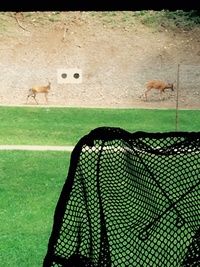N310 load data
+10
oldsalt444
daflorc
spursnguns
Chris Miceli
S148
AllAces
Kermit Workman
JIMPGOV
Aprilian
Pat Capobianco
14 posters
Page 2 of 2
Page 2 of 2 •  1, 2
1, 2
 N310 load data
N310 load data
First topic message reminder :
I just ordered a Les Baer Premier ii 1.5" guarantee 3.5 trigger pull and I also purchased a lb of N310. Do you guys have a favorite .45 acp load? I'll be using some 185gr and some 200gr bullets.
I just ordered a Les Baer Premier ii 1.5" guarantee 3.5 trigger pull and I also purchased a lb of N310. Do you guys have a favorite .45 acp load? I'll be using some 185gr and some 200gr bullets.
Pat Capobianco- Posts : 17
Join date : 2016-07-31
 Re: N310 load data
Re: N310 load data
Use a dial or digital caliper and measure the case mouth outside diameter on a completed round. Use the beveled portion of the caliper jaws and have a light touch. Takes a little manual dexterity.

Wobbley- Admin
- Posts : 4808
Join date : 2015-02-12
 Re: N310 load data
Re: N310 load data
Rockyfarmer wrote:Ok so I am new to this. Not sure what it means when you give a crimp measurement. Can you explain what that means and how you get it. Thanks

Chris Miceli- Posts : 2715
Join date : 2015-10-27
Location : Northern Virginia
 Re: N310 load data
Re: N310 load data
It appears that the taper crimp illustration above is incorrect as I have not seen an adjustable die yet which can put a straight crimp of a fixed diameter on a section of case. My Redding Taper Crimp Die clearly has a linear relationship from mouth to end of crimped section and therefore must move the case into the bullet farther at the mouth (and indeed, pulling bullets does reveal the bullet max reduction in diameter is at the case mouth).
I have a new measurement quandary which clarifying the above drawing creates. For match loads, I am lightly chamfering my cases inside and out, to eliminate brass shavings.
Look the inside case chamfer alone - for the same caliper OD measurement, you get less “bite” into the bullet at the mouth. For the outside chamfer alone - you get a smaller OD at the tip of the case for the same crimp. Combine the two and a .467 crimp measured on a chamfered case is perhaps like a .469 crimp measured on an unchamfered case.
I’ve taken to measuring just below the chamfer to approximate how my crimp compares to posted data.
Any thoughts about my logic for measuring crimp on chamfered cases?
(I'm sure someone is going to question, "Why?" For me it is simple, I do not have a tumbler so I can't tumble finished rounds to remove the brass flakes. I am trying to eliminate the flakes at the source in order to not have to hand wipe each round.)
I have a new measurement quandary which clarifying the above drawing creates. For match loads, I am lightly chamfering my cases inside and out, to eliminate brass shavings.
Starline wrote:One other cause can be a burr at case mouth created by the final trim operation, which grabs onto expander as it comes back up. This situation does not often appear and can be fixed by deburring case mouth or inside lubing cases.
Look the inside case chamfer alone - for the same caliper OD measurement, you get less “bite” into the bullet at the mouth. For the outside chamfer alone - you get a smaller OD at the tip of the case for the same crimp. Combine the two and a .467 crimp measured on a chamfered case is perhaps like a .469 crimp measured on an unchamfered case.
I’ve taken to measuring just below the chamfer to approximate how my crimp compares to posted data.
Any thoughts about my logic for measuring crimp on chamfered cases?
(I'm sure someone is going to question, "Why?" For me it is simple, I do not have a tumbler so I can't tumble finished rounds to remove the brass flakes. I am trying to eliminate the flakes at the source in order to not have to hand wipe each round.)
Last edited by Aprilian on Mon Feb 05, 2018 1:28 pm; edited 1 time in total

Aprilian- Posts : 987
Join date : 2016-05-13
Location : Minnesota
 Re: N310 load data
Re: N310 load data
There are two kinds of crimps that are used in reloading. A "Roll" crimp and a "taper"crimp".
The roll crimp is a radiused "bending" of the case mouth into the bullet. This is quite commonly done into a cannalure of the bullet. This insures that the bullet will not move when feed the action of a firearm. If the bullet is pushed back into the case ,the case has less capacity and the pressure can rise dramatically. Most all die sets have roll crimp seating dies.
The taper crimp is a gradual angled reduction of the case mouth into the bullet. The .45 ACP cartridge uses the case mouth to headspace in the chamber. Or the case mouth sets against the end of the chamber keeping it from going farther forward. Bottleneck cases(rifle) use the case shoulder to headspace and rimmed cases use the rim to headspace(,38 Special).
A roll crimp on a case that uses the case mouth to headspace allows more headspace of the loaded round since the roll crimp effectively reduces the length of the brass or the length where the roll crimp strikes the end of the chamber. A taper crimp slightly reduces the case mouth but not enough to allow any of the brass case to extend beyond the end of the chamber. Thus the full length of the brass case determines the length of headspace with a taper crimp.
The measurement is the diameter of the case mouth at the very end of the brass. That would be the bullet diameter (.452) plus the thickness of the brass on each side of the case minus the amount of taper crimp. This dimension is always in the area of .469 to .472 on the ,45 ACP cartridge. A taper crimp is considered to be more accurate with the .45 ACP. Again the taper crimp insures that the bullet does is not pushed back into the case when cycled thru a 1911 or other pistol.
With most die sets the taper crimp die is not included and must be bought separately.
The roll crimp is a radiused "bending" of the case mouth into the bullet. This is quite commonly done into a cannalure of the bullet. This insures that the bullet will not move when feed the action of a firearm. If the bullet is pushed back into the case ,the case has less capacity and the pressure can rise dramatically. Most all die sets have roll crimp seating dies.
The taper crimp is a gradual angled reduction of the case mouth into the bullet. The .45 ACP cartridge uses the case mouth to headspace in the chamber. Or the case mouth sets against the end of the chamber keeping it from going farther forward. Bottleneck cases(rifle) use the case shoulder to headspace and rimmed cases use the rim to headspace(,38 Special).
A roll crimp on a case that uses the case mouth to headspace allows more headspace of the loaded round since the roll crimp effectively reduces the length of the brass or the length where the roll crimp strikes the end of the chamber. A taper crimp slightly reduces the case mouth but not enough to allow any of the brass case to extend beyond the end of the chamber. Thus the full length of the brass case determines the length of headspace with a taper crimp.
The measurement is the diameter of the case mouth at the very end of the brass. That would be the bullet diameter (.452) plus the thickness of the brass on each side of the case minus the amount of taper crimp. This dimension is always in the area of .469 to .472 on the ,45 ACP cartridge. A taper crimp is considered to be more accurate with the .45 ACP. Again the taper crimp insures that the bullet does is not pushed back into the case when cycled thru a 1911 or other pistol.
With most die sets the taper crimp die is not included and must be bought separately.
Kermit Workman- Posts : 157
Join date : 2011-06-11
Age : 69
Location : Lenore, WV
 Re: N310 load data
Re: N310 load data
What’s the best and easiest way to measure the crimp?
Rockyfarmer- Posts : 14
Join date : 2018-01-27
 Re: N310 load data
Re: N310 load data
1 lock caliper jaws to your desired crimp
2 slowly increase die depth until the case just lightly slides inside the locked jaws. Make sure both the jaws are square to the case mouth and that both sides of the case are just inside the jaws
3 lock down die until next time you need to change something (i.e. changing from lead to FMJ)
2 slowly increase die depth until the case just lightly slides inside the locked jaws. Make sure both the jaws are square to the case mouth and that both sides of the case are just inside the jaws
3 lock down die until next time you need to change something (i.e. changing from lead to FMJ)

Aprilian- Posts : 987
Join date : 2016-05-13
Location : Minnesota
 Re: N310 load data
Re: N310 load data
Kermit Workman wrote:It may be that he was noting that the Federal brass was LARGE primers as opposed to small primers in some Federal brass.(not Large Rifle) There is no reason to use Large Rifle primers.
Finally got a hold of Dave. Just a an error “brain fart”
Starline brass not Federal.
Federal Large Pistol Primers.

JayhawkNavy02- Posts : 821
Join date : 2014-03-01
Age : 45
Location : San Diego
Page 2 of 2 •  1, 2
1, 2
 Similar topics
Similar topics» ? Chrono Data N310 45 acp
» 9mm Hardball Loads
» .32 S&W Long
» WST 185gr load data
» Need opinions on load data
» 9mm Hardball Loads
» .32 S&W Long
» WST 185gr load data
» Need opinions on load data
Page 2 of 2
Permissions in this forum:
You cannot reply to topics in this forum